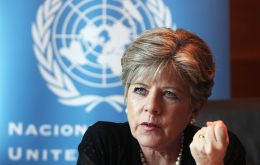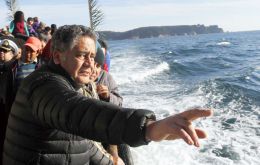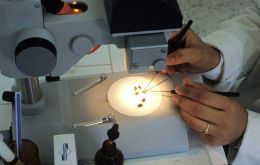MercoPress. South Atlantic News Agency
Stories for 2014
-
Tuesday, July 8th 2014 - 07:44 UTC
World Cup cleared of doping after more than 1.000 negative tests

Every player tested for drugs at the World Cup in Brazil has been cleared of doping after more than 1,000 tests came back negative, FIFA's medical committee announced on Monday.
-
Tuesday, July 8th 2014 - 07:35 UTC
FIFA will take no disciplinary action against player who injured Neymar

FIFA will not take action against the Colombia player who injured Neymar and ended the Brazil star's World Cup. FIFA said its disciplinary panel “cannot consider this matter” under the rules because the match referee saw the challenge by Camilo Zuniga and judged it at the time.
-
Tuesday, July 8th 2014 - 07:25 UTC
“Without Chile's help, we would have lost the Falklands”, says former RAF intelligence

Chile's support for Britain during the Falklands War has been revealed for the first time by the man who was dispatched, with only hours notice, to secure a South American ally, according to an article in the Daily Telegraph credited to Harriet Alexander.
-
Tuesday, July 8th 2014 - 07:01 UTC
FIFA hospitality's provider arrested over World Cup tickets scalping

Rio do Janeiro state police said Monday they arrested the head of the soccer world governing body's hospitality provider, accusing him of aiding scalpers who illegally resold World Cup tickets worth an estimated 100 million dollars.
-
Tuesday, July 8th 2014 - 00:08 UTC
IDB loan to help Uruguay with mathematics and English learning at schools

The Inter-American Development Bank (IDB) has approved a 6 million dollars loan to Uruguay to finance the Plan Ceibal II (digital content), which will help to strengthen mathematics learning by 90,000 primary and middle school students and extend English teaching to half of all 4th, 5th and 6th graders in urban public primary schools.
-
Monday, July 7th 2014 - 23:53 UTC
Sao Paulo metro will have 'ladies only' wagons given sexual harassment complaints

The Sao Paulo Legislative Assembly has approved a bill making it mandatory for regional train and underground companies of have 'pink' wagons, exclusively for ladies at rush hours.
-
Monday, July 7th 2014 - 23:42 UTC
China economy with moderate growth in medium term, says World Bank

China’s growth will moderate over the medium term as the economy continues to rebalance gradually. Growth is expected to slow to 7.6% in 2014, and 7.5% in 2015, from 7.7% in 2013, according to the World Bank’s China Economic Update latest edition.
-
Monday, July 7th 2014 - 23:09 UTC
ECLAC sides with Argentina; calls for Collective Action Clause for sovereign debts

The Executive Secretary of the Economic Commission for Latin America and the Caribbean (ECLAC), Alicia Bárcena, has sided with Argentina in the holdout hedge funds litigation arguing on the need to establish an international mechanism that would allow for the resolution of conflicts of interest caused by sovereign defaults:
-
Monday, July 7th 2014 - 22:57 UTC
Flying squid controversy in Chile between artisanal fishermen and industry

The Chilean government insists that it has a single position on the jumbo flying squid fisheries management controversy currently exposed to a conflict of interests: 80% of the catch for the artisanal sector and 20% for industry.
-
Monday, July 7th 2014 - 22:49 UTC
FAO/WHO elaborating new guidelines for identifying food-borne parasites

A “Top Ten” list identifying the food-borne parasites of greatest global concern has been released by FAO, and new guidelines are being developed to control them. The parasites affect the health of millions of people every year, infecting muscle tissues and organs, causing epilepsy, anaphylactic shock, amoebic dysentery and other problems. Some can live on in our bodies for decades.
